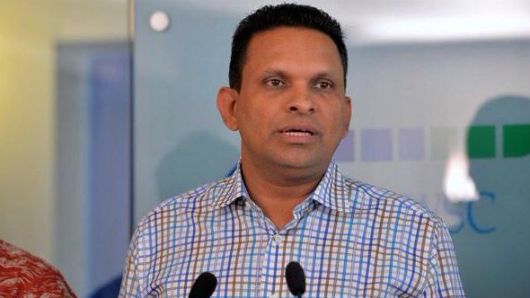The United Nations in the Maldives has commended relief efforts during the Malé water crisis, though the opposition has attacked the governments preparedness and subsequent handling of events.
In a press release today, the UN in Maldives commended the “outstanding response” of the government, noting that measures were also being taken to address the needs of vulnerable and special needs population.
“The situation does not warrant any humanitarian assistance at the moment. UN is working with the Government to monitor closely that there will be no deterioration of the situation,” the statement continued.
The President’s Office announced today that the closure of government offices would continue for the rest of the week, while offers of foreign assistance have continued to pour in.
Meanwhile, the opposition Maldivian Democratic Party (MDP) condemned government efforts – in particular the decision to continue billing residents for water usage.
“Water should be provided free of charge until the water crisis is resolved,” said Rozaina while speaking at an MDP press conference.
Minister of Defense Colonel (retired) Mohamed Nazim said this morning that the Malé Water and Sewerage Company’s (MWSC) board of governors have decided to implement a 30 percent discount on water transactions for the month of December.

Addressing the public for the first time during the crisis yesterday, President Abdulla Yameen noted that getting water supplies to the upper floors of buildings had been problematic.
MWSC’s decision contradicts a company statement released two days ago (December 6) saying customers would not be charged until the current crisis is over in order to provide relief for the ground floor level residents who have been donating water.
MWSC charges a progressive rate on the water usage, which rises as the usage increases over a MVR30 fixed monthly charge. The rate can go as high as MVR95 per cubic meter when usage increases over 500 liters.
Relief
Nazim also revealed governments plans to set up a ‘Malé water crisis management fund’ to collect donations in order to recover the MVR300 million (US$20 million) spent on the management of the crisis.
Rozaina criticised the estimated figure of US$20 million by saying that the MDP demanded a technical viewpoint on the damages and an explanation of why US$20 million is required for the repairs. The party has asked whether MWSC’s facilities were insured.
An unnamed Saudi Arabian has already donated US$ 1 million to the fund while local business group Champa Brothers pledged to provide US$100,000.
The MDP has also slammed the government’s failure to give a set date for the resumption of normal services, with members of the president’s task force telling local media yesterday that the issue could not be solved within a “politically desirable” timeframe.
Continuing its extensive relief efforts, Indian navy fleet tanker INS Deepak arrived yesterday bringing with it 1,250 tons of water. The water was then pumped to tanks in Malé through 400 meters of pipe.
The ship – which also has RO capabilities – is now at anchorage near Malé where it be producing 100 tons of water per day which will then be transported to the capital via barges.

Indian High Commissioner to the Maldives, MR Rajeev Shahare – speaking aboard INS Deepak yesterday – said that the Indian government had offered technical assistance with the repairs which was refused by the government saying that they are consulting a Japanese firm.
So far, 10 Indian military airplanes have landed at Ibrahim Nasir International Airport (INIA) bringing with them more than 200 tons of water.
State Bank of India (SBI) also joined relief efforts today, distributing 7.5 tons of water.
A Chinese vessel which arrived last night capable of producing 90 tons of water per day delivered 600 tons of water today to the capital. Two Chinese military flights landed last night with 40 tons of water in between them.
A Bangladeshi military vessel with 5 desalination plants and one hundred tonnes of water is also due to arrive on Thursday (December 11).
Meanwhile, President’s Office Spokesperson Ahmed Muaz announced today hat the government has decided to close all its offices in Malé for the rest of the week after considering the difficulties people could face as a result of the current water problems in Malé.
Muaz noted said that the President’s Office will be open from 10 am to 1pm,while the Maldives Monetary Authority has also announced that it and other banks will be between 11am to 2pm to provide banking services for the public.
Related to this story
No fall back for disaster of this magnitude: President Yameen
Government seeks US$20 million in donations to repair Malé’s desalination plant
President Yameen to return to Maldives as water crisis enters third day
Nasheed calls for inquiry into MWSC fire
Likes (3)Dislikes
(3)Dislikes (0)
(0) 
